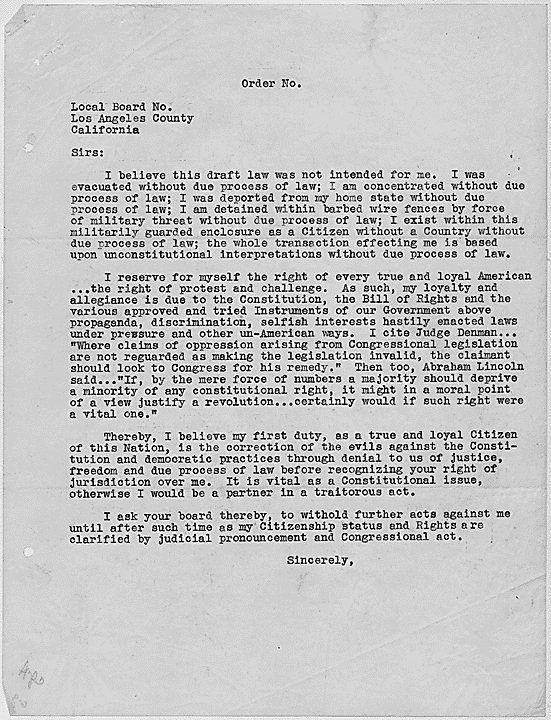A WWII-Era Protest Letter, Sent By Japanese-American Internees Resisting the Draft
The Vault is Slate's history blog. Like us on Facebook, follow us on Twitter @slatevault, and find us on Tumblr. Find out more about what this space is all about here.
Second-generation Japanese-Americans interned at the Heart Mountain “Relocation Center” in Wyoming used this form letter to protest the government’s demand that they register with Selective Service. The letter was entered as evidence in a court case brought against seven organizers of draft resistance at Heart Mountain.
In 1942 and 1943, Japanese-Americans, who were classified as “enemy aliens,” were exempt from the draft; beginning in 1944, they were newly eligible. The leader of the Heart Mountain resisters, Kiyoshi Okamoto, an internee in his mid-50s, was personally ineligible for the draft, but saw the government’s service requirement as another in a long list of wartime outrages against Japanese-Americans. Okamoto, by all accounts a remarkable man, undertook a campaign to convince the Nisei (second-generation Japanese-Americans) to refuse the government’s request.
The sixty-three Heart Mountain draft resisters weren’t opposed to military service; many indicated that if they were given an answer as to their citizenship status, they would be happy to enlist. Kiyoshi Okamoto wrote in an impassioned essay also entered into the court record: “If the Nisseis are Americans and Citizens of this Nation by right of birth and Constitutional grant then, let be decided once and for all and without equivocation our positions as members of this Nation.”
Okamoto and six other leaders of this resistance were convicted of violating the Selective Service Act, and sentenced to four years in federal prison. Their sentences were overturned on appeal in 1946.
26,000 Japanese-Americans served in the military during the war.

